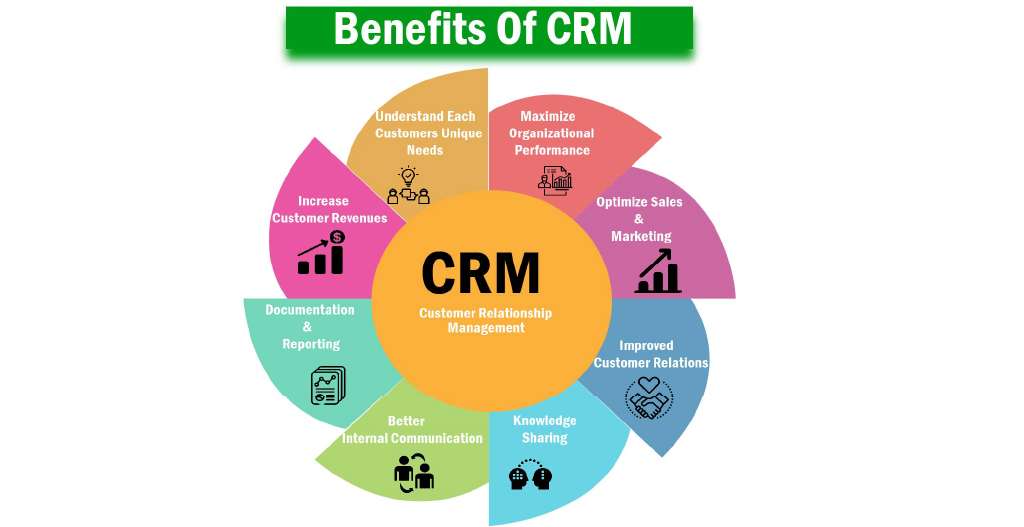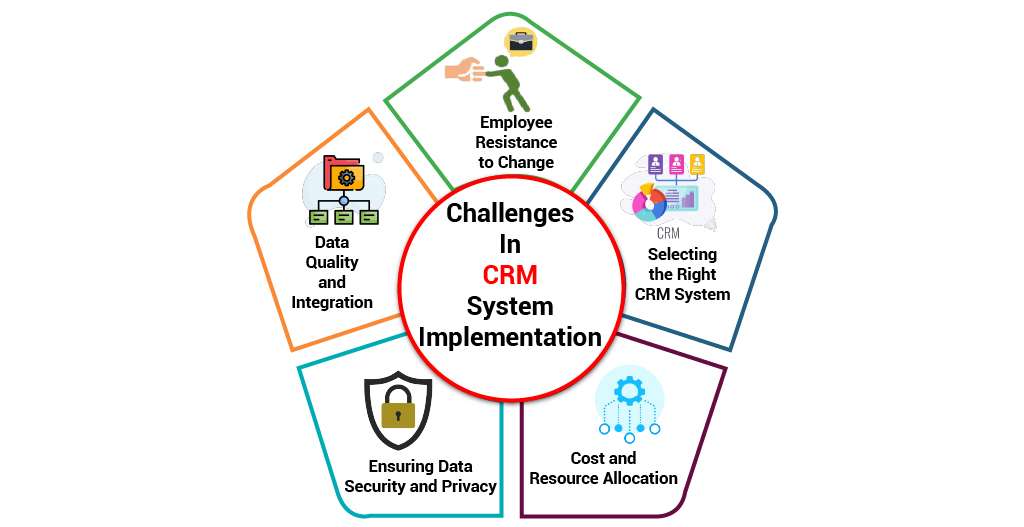The Benefits and Challenges of CRM Implementation
In today’s fast-paced business environment, managing relationships with customers is the key to success. Software for managing customer relationships (CRM) has become an important tool for organisations looking to improve consumer satisfaction and control operations.
In this article, we will examine the various benefits of using CRM Software and discuss some common challenges that organizations may face during CRM system implementation:
Benefits of Implementing CRM System:

These are the Top 10 benefits of implementing a CRM System:
One of the main benefits of CRM software is its ability to centralise and organise client data. With a CRM system, businesses can easily capture and store customer information, including contact details, purchase history, preferences, and interactions. This comprehensive view of customer data allows businesses to get important insights into the behaviors and preferences of their consumers, allowing them to adjust their product offers and marketing plans accordingly.
2. Improved Lead Generation and Conversion
CRM software plays an essential role in lead management and conversion. It enables businesses to capture and track leads, assign them to sales representatives, and monitor the progress of each piece of information through the sales funnel. By effectively managing leads, businesses can identify their most promising prospects and implement targeted marketing and sales strategies to convert them into paying customers.
3. Streamlined Sales and Marketing Processes
With CRM software, businesses can automate and streamline their sales and marketing processes. It allows sales teams to track customer interactions, manage sales pipelines, and schedule follow-ups, ensuring that no opportunities slip through the cracks. Marketing teams can leverage CRM data to segment customers, create personalized campaigns, and measure the effectiveness of their marketing efforts.
4. Efficient Customer Service and Support
CRM software empowers businesses to provide exceptional customer service and support. Customer care employees can address problems quickly and effectively with access to real-time data and complete customer history. CRM systems also enable businesses to track and manage customer inquiries, complaints, and feedback, ensuring timely responses and effective problem resolution.
5. Data-driven Decision Making
CRM software enables businesses to make data-driven decisions. With comprehensive analytics and reporting features, businesses can gain valuable insights into their sales performance, customer trends, and marketing effectiveness. These insights help businesses identify areas for improvement, optimize their strategies, and make informed decisions that drive growth and profitability.
6. Increased Customer Retention and Loyalty
CRM software plays an important role in customer retention and loyalty. By using customer data and preferences, businesses can proactively engage with customers, anticipate their needs, and deliver personalized experiences. This level of attentiveness and customization enhances customer satisfaction, builds loyalty, and increases the likelihood of repeat purchases and long-term relationships.
7. Scalability and Growth Opportunities
As businesses grow, managing customer relationships becomes more complex. CRM software offers scalability and growth opportunities by providing a robust platform to handle increasing customer volumes and expanding operations. It assures that companies can efficiently manage their increasing customer base and keep high levels of customer satisfaction and involvement.
8. Enhanced Reporting and Analytics
CRM software provides powerful reporting and analytics capabilities that help businesses measure their performance and identify areas for improvement. Through customizable dashboards and reports, businesses can track key performance indicators (KPIs), monitor sales and marketing metrics, and gain insights into their overall business health. Businesses can make smart decisions and improve their strategy with the help of this data-driven method.
9. Improved Sales Forecasting
Accurate sales forecasting is crucial for effective business planning. CRM software provides businesses with real-time visibility into their sales pipelines, enabling them to forecast future sales with greater accuracy. By analyzing historical data, tracking sales trends, and monitoring customer interactions, businesses can make reliable sales forecasts and align their resources accordingly.
10. Personalized Customer Experiences
CRM software allows businesses to deliver personalized customer experiences at scale. By leveraging customer data and insights, businesses can tailor their communications, recommendations, and offers to individual customers’ preferences and needs. This customization strengthens brand loyalty, develops long-term customer relationships, and improves customer engagement.
Challenges in CRM System Implementation

Challenges in CRM System Implementation: While the benefits of CRM system implementation are significant, organizations also face several challenges during the process. To ensure a successful CRM implementation, it is essential to be aware of these problems and take proactive measures to address them.
1. Employee Resistance to Change
One of the most significant challenges in CRM system implementation is resistance to change from employees. People tend to be comfortable with their existing workflows and may be reluctant to adopt new technologies and processes. Overcoming this resistance requires effective change management strategies, including clear communication, training programs, and the involvement of employees in the implementation process.
2. Data Quality and Integration
CRM systems depend largely on precise and current data. However, organizations often suffer from data quality problems, such as duplicate records, missing data, and inconsistent formatting.
Integrating the CRM system with existing data sources and legacy systems can be complex and time-consuming. For the CRM system to operate at its finest, it is important to put time and effort into data cleansing, standardisation, and integration.
3. Selecting the Right CRM System
It can be difficult to select the best CRM system for a company’s particular requirements. Organisations must carefully compare various CRM solutions, taking into account elements like functionality, scalability, ease of use, integration capabilities, and vendor reputation, with the large number of options in the market. By choosing the incorrect CRM system, resources can be wasted, and expected results may not be achieved.
4. User Adoption
Even after successful implementation, the CRM system’s effectiveness depends on user adoption. If employees do not fully embrace and utilize the system, its benefits may not be realized. User adoption challenges can arise due to factors such as a lack of training, inadequate user interfaces, and poor system performance. Providing comprehensive training, intuitive interfaces, and addressing performance issues can encourage user adoption.
5. Cost and Resource Allocation
Implementing a CRM system involves a financial investment, both in terms of software licenses and infrastructure requirements. Organizations must carefully allocate their resources and budget to cover implementation costs, ongoing maintenance, and user training. Failure to allocate sufficient resources can result in suboptimal system performance and limited user adoption.
6. Ensuring Data Security and Privacy
As CRM systems store sensitive customer information, organizations must prioritize data security and privacy. The safety and privacy of sensitive data must be ensured at all costs. To protect themselves against data breaches and unauthorised access, organisations must establish strong security measures including encryption, access limits, and regular data backups. To prevent legal consequences, compliance with relevant data privacy regulations is also important, such as the General Data Protection Regulation (GDPR).
7. Return on Investment (ROI) Measurement
Determining the ROI of CRM system implementation can be challenging. It may take time to realize the full benefits of the system, making it difficult to assess the success of the implementation accurately. Organizations should define key performance indicators (KPIs) and establish mechanisms to track and measure the impact of the CRM system on customer satisfaction, sales, and other relevant metrics.
Conclusion
In conclusion, the Implementation of CRM software offers various benefits for organisations of all sizes and industries. Businesses can maintain their competitiveness in today’s customer-centric market and provide outstanding value to their customers by utilising the power of CRM.
Organizations must be prepared to tackle challenges such as data integration, employee resistance to change, selecting the right CRM system, cost and resource allocation, and ensuring data security and privacy. By understanding and addressing these challenges carefully, organizations can maximize the benefits of their CRM system and enhance their overall customer management capabilities.

